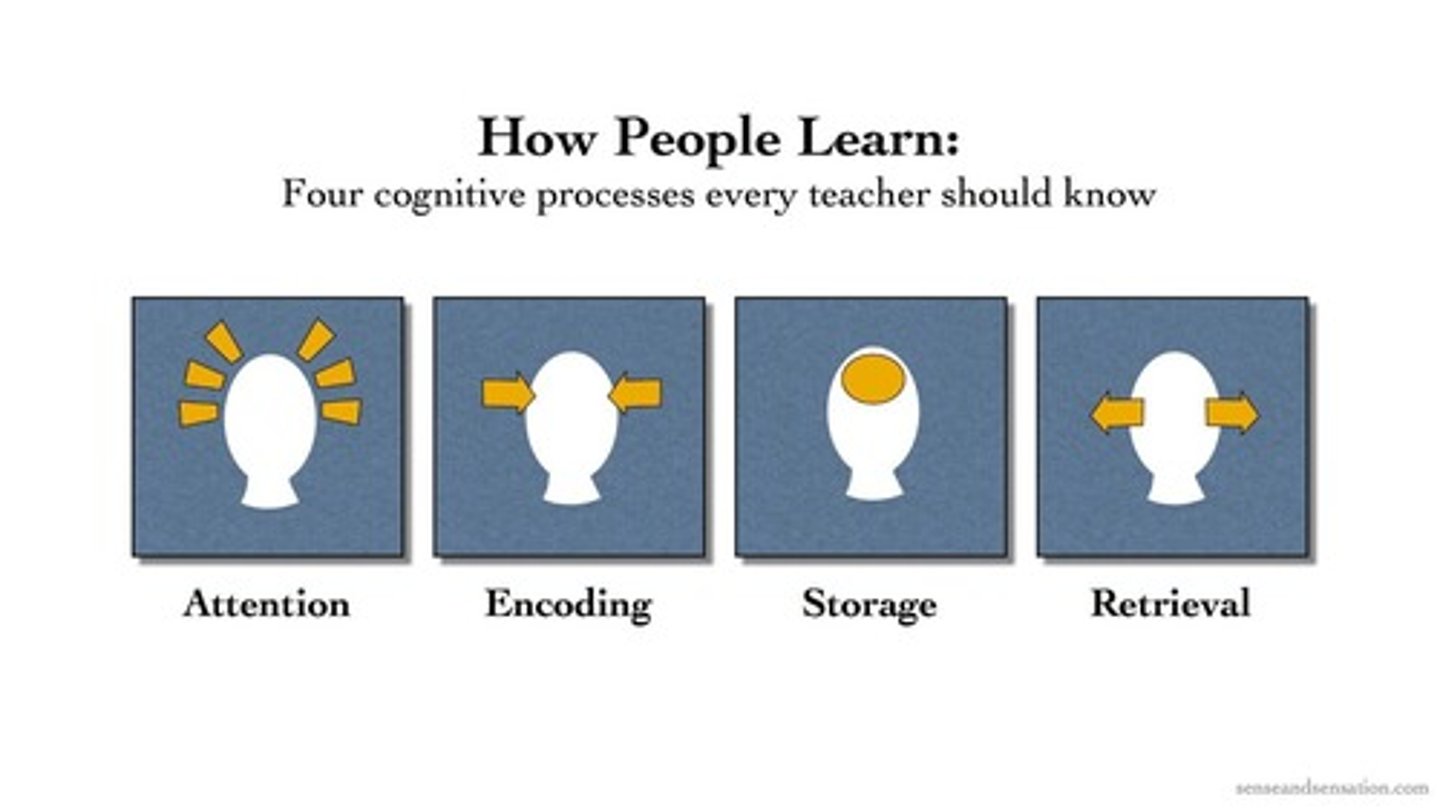Understanding Eyewitness Testimony and Memory Errors
1/25
There's no tags or description
Looks like no tags are added yet.
Name | Mastery | Learn | Test | Matching | Spaced | Call with Kai |
|---|
No analytics yet
Send a link to your students to track their progress
26 Terms
What is eyewitness testimony?
Eyewitness testimony refers to the account given by individuals who observed an event, often used in legal contexts after a crime has been committed.
What are the three stages of memory?
The three stages of memory are Attention, Encoding, and Storage.

What is the role of attention in memory?
Attention is crucial as it allows an individual to notice information before it can be encoded.
What happens during the encoding stage of memory?
During encoding, information is converted into a form that the brain can understand, which is essential for later recall.
How is information stored in memory?
Encoded information is stored in either short-term or long-term memory.
What is retrieval in the context of memory?
Retrieval is the process of recalling stored information, which can include autobiographical memories.
What factors can affect the reliability of eyewitness testimony?
Factors include psychological influences, environmental context, retrieval cues, weapon focus, reconstructive memory, misleading information, false memories, photokits, and police lineups.
What is weapon focus?
Weapon focus occurs when a witness's attention is diverted to a weapon, impairing their ability to recall other details of the crime.

What is reconstructive memory?
Reconstructive memory refers to the process of recalling an event by filling in gaps in memory, often influenced by beliefs and expectations.
Who is Elizabeth Loftus and what is her contribution to the study of memory?
Elizabeth Loftus is a researcher who studied reconstructive memory and found that memories can be easily altered or influenced.
How can misleading information impact eyewitness testimony?
Misleading information can lead to inaccurate recollections and representations of events by eyewitnesses.
What are false memories?
False memories are recollections that individuals believe to be true but are actually distorted or fabricated, often influenced by suggestion.
What are photokits and identikits used for?
Photokits and identikits are tools used to help eyewitnesses create an image of a suspect's face for identification purposes.
What constitutes a fair police lineup?
A fair police lineup includes individuals who all potentially fit the witness's description, ensuring the suspect is accompanied by known innocent individuals.
What problems can arise with police lineups?
Problems include the expectation that the suspect is present, leading to mistaken identity, and the possibility that witnesses may not have fully observed the suspect's features.
What is the difference between an eyewitness and an expert witness?
An eyewitness provides testimony based on their direct observation of an event, while an expert witness offers specialized knowledge on a particular subject.
What are the roles of forensic psychologists in the courtroom?
Forensic psychologists assess dangerousness, determine fitness to stand trial, evaluate eyewitness testimony, and assess criminal responsibility.
How can environmental factors affect memory recall?
Environmental factors such as context and specific details of the event can influence how accurately a memory is recalled.
What are retrieval cues?
Retrieval cues are stimuli that help access stored memories, such as returning to a location associated with the memory.
What is the significance of context-dependent retrieval cues?
Context-dependent retrieval cues can enhance memory recall by prompting memories associated with specific locations.
How can police questioning techniques affect eyewitness accuracy?
Misleading questions during police interviews can distract eyewitnesses and lead to inaccurate information.
What is the impact of psychological factors on memory?
Psychological factors, including beliefs and expectations, can distort memories and affect the reliability of eyewitness accounts.
What is the potential effect of misleading information on eyewitness testimonies?
Misleading information can manipulate eyewitnesses' memories, leading to inaccuracies in their testimonies.
What is the process of creating a photokit or identikit like for eyewitnesses?
Creating a photokit or identikit can be overwhelming for eyewitnesses, especially if they struggle to recall specific details.
What is the importance of assessing eyewitness testimony in court?
Assessing eyewitness testimony is crucial as it can significantly influence the outcome of legal proceedings, including wrongful convictions.
What is the role of forensic psychologists in assessing eyewitness testimony?
Forensic psychologists evaluate the reliability and accuracy of eyewitness testimony to inform legal decisions.